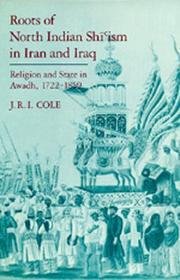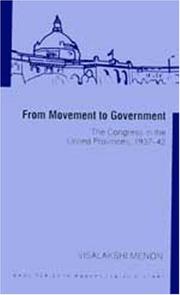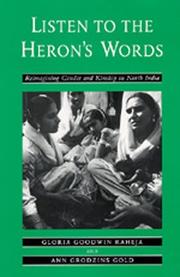| Listing 1 - 10 of 13 | << page >> |
Sort by
|
Book
Year: 1880 Publisher: London : W. H. Allen,
Abstract | Keywords | Export | Availability | Bookmark
 Loading...
Loading...Choose an application
- Reference Manager
- EndNote
- RefWorks (Direct export to RefWorks)
Oudh (India) --- History.
Digital
Year: 1796 Publisher: [S.l. s.n.
Abstract | Keywords | Export | Availability | Bookmark
 Loading...
Loading...Choose an application
- Reference Manager
- EndNote
- RefWorks (Direct export to RefWorks)
Book
ISBN: 113919917X 1108046703 Year: 1855 Publisher: Place of publication not identified : Cambridge : publisher not identified, Cambridge University Press
Abstract | Keywords | Export | Availability | Bookmark
 Loading...
Loading...Choose an application
- Reference Manager
- EndNote
- RefWorks (Direct export to RefWorks)
The writer William Knighton (c.1824-1900) spent much of his career in Sri Lanka and India. Published in 1855, this is an account of the court of the notorious Indian King Nussir-u-deen (c.1803-37), written from the viewpoint and using the testimony of an anonymous British member of the King's retinue. Richly descriptive, it is an intimate portrait of life in the service of a hedonistic sovereign so hated and paranoid that he feared his own family would try to poison him. He is characterised as a cruel and frivolous man who only trusted his sycophantic barber. As well as describing the lavish royal lifestyle, the narrator documents the King's thirst for hunting, for exotic-animal fights and for abusing and humiliating members of the royal family. This is a lurid and engrossing tale of a monarch in decline and the corruption and favouritism that led to his eventual assassination.
Oudh (India) --- India --- History --- Social Science
Book
Year: 1858 Publisher: London : R. Bentley,
Abstract | Keywords | Export | Availability | Bookmark
 Loading...
Loading...Choose an application
- Reference Manager
- EndNote
- RefWorks (Direct export to RefWorks)
Oudh (India) --- India --- Description and travel. --- Description and travel

ISBN: 0520056418 0585159351 Year: 1988 Volume: 6 Publisher: Berkeley, Calif. University of California Press
Abstract | Keywords | Export | Availability | Bookmark
 Loading...
Loading...Choose an application
- Reference Manager
- EndNote
- RefWorks (Direct export to RefWorks)
In this pioneering study of the Twelver Shi'i branch of Islam prevalent in Iraq and Iran, J. R. I. Cole traces the influence of Shi'i rule on the development of religious communalism and conflict in the North Indian State of Awadh (Oudh). He also examines the relationship of the Shi'i clergy to the state and the clerical reaction to British imperialism and capitalism. Based on research in rare manuscripts and in archives, the book reveals that the Shi'i clergy advocated policies that caused resentment among Sunnis and Hindus, thereby promoting religious communalism and setting the stage for modern communal conflict. The Shi'i learned men took government posts in support of Awadh's Shi'i nawabs and shahs Awadh state support, in turn, helped transform Shi'ism from a persecuted "sect" to a dominant, if still minority, religious establishment. Sociologically, the book draws attention to the specific role of the state in defining "sect" and "church." It also argues the importance of class divisions within the Shi'i community, showing that the dominant clerical ideology was often not accepted by the laboring strata. Cole's study supports the view that Muslim communalism in Northern India had genuine historical roots and was not simply an elite strategy of modern Muslim politicians. Contrary to the arguments of some writers and to the image projected by Iran's current ayatullahs, he claims that most Shi'i clergy did not play a role of opposition to the state.
Shīʻah --- Islam and state --- Shåi°ah --- Islam --- Religion --- Philosophy & Religion --- History. --- History --- Oudh (India) --- Ethnic relations. --- Religion. --- Mosque and state --- State and Islam --- Imamites --- Shia --- Shiism --- Twelvers (Islam) --- Awadh (India) --- Oude (india) --- History of Asia --- anno 1700-1799 --- anno 1800-1899 --- Iraq --- Iran --- State, The --- Ummah (Islam) --- Islamic sects --- Alids --- United Provinces of Agra and Oudh (India) --- Avadha (India) --- Oude (India) --- Shīʻah

ISBN: 1282425099 9786612425097 8132103688 9788132103684 8178291916 9788178291918 8178291924 9788178291925 0761996206 9780761996200 0761996214 9780761996217 Year: 2003 Publisher: New Delhi Thousand Oaks, Calif. Sage Publications
Abstract | Keywords | Export | Availability | Bookmark
 Loading...
Loading...Choose an application
- Reference Manager
- EndNote
- RefWorks (Direct export to RefWorks)
For a long time the provincial autonomy phase of the Indian national movement was largely ignored by historians. However, it is now becoming increasingly evident that vital changes in power equations occurred during that period. Starting from this premise, Visalakshi Menon provides a detailed account of the Congress Ministry of 1937-39 in the United Provinces and explores the internal dynamics of an organization performing the dual function of a government in power and a movement spearheading the anti-imperialist struggle. She amply demonstrates that this period was not a dormant one as genera
Indian National Congress. --- U.P.C.C. --- UPCC --- U.P.P.C.C. --- UPPCC --- History. --- United Provinces of Agra and Oudh (India) --- Ṣūbajāti-i Mutaḥiddah (India) --- Ṣūbah-yi Mutaḥiddah (India) --- United Provinces (India) --- Agra and Oudh, United Provinces of (India) --- U.P. --- UP --- Oudh (India) --- North-Western Provinces (India) --- Uttar Pradesh (India) --- Politics and government.
Book
ISBN: 1139094858 1108036600 Year: 2015 Publisher: Cambridge : Cambridge University Press,
Abstract | Keywords | Export | Availability | Bookmark
 Loading...
Loading...Choose an application
- Reference Manager
- EndNote
- RefWorks (Direct export to RefWorks)
William Hoey (1849-1919) was a magistrate in Lucknow, India when this book was published by the American Missionary Press in 1880. At the time, Lucknow was the seventh largest city in the British Empire, and it was the capital of the province that had most recently come under British rule. Hoey's monograph captures the details of trade in the city and surrounding regions at this time of change. Part 1 outlines the prominent features of trade in the area and includes tables of imports and exports. Part 2 focuses on Lucknow specifically, and contains the author's discussion of the impact of British rule on the city. The third part is a detailed A-Z of every trade, including information on production, prices and profit, and the work concludes with an extensive glossary of Indian terms. The level of detail in this work makes it an invaluable historical document.
Uttar Pradesh (India) --- Lucknow (India) --- India, North --- Commerce --- History --- India, Northern --- North India --- Northern India --- Uttar Bhārat --- Uttara Bhārata --- Lucknow --- Laknāʼū (India) --- Lakkhnau (India) --- Lakhanaū (India) --- Лакхнау (India) --- U.P. --- UP --- State of Uttar Pradesh (India) --- Uttara Pradeśa (India) --- Уттар-Прадеш (India) --- United Provinces of Agra and Oudh (India)
Book
ISBN: 935150428X 9351507890 9351501809 9789351501800 9788132116639 8132116631 9789353880088 9353880084 Year: 2016 Publisher: New Delhi : SAGE,
Abstract | Keywords | Export | Availability | Bookmark
 Loading...
Loading...Choose an application
- Reference Manager
- EndNote
- RefWorks (Direct export to RefWorks)
'Development Failure and Identity Politics in Uttar Pradesh' provides a qualitative, in-depth understanding of development failures and identity politics in Uttar Pradesh (UP). It investigates neoliberal change and political transformation in India through the lens of UP, India's largest and, by some measures, poorest state. It examines the connection between transitions in the contemporary economy of India and transformations in politics from the standpoint of UP. The book demonstrates how an understanding of dynamics in UP might provide new perspective on issues such as the state, the civil society, caste, democracy and social impact of economic reforms-issues that are the subject of vigorous debate in India as a whole.
Infrastructure (Economics) --- Women --- Human females --- Wimmin --- Woman --- Womon --- Womyn --- Females --- Human beings --- Femininity --- Capital, Social (Economics) --- Economic infrastructure --- Social capital (Economics) --- Social infrastructure --- Social overhead capital --- Economic development --- Human settlements --- Public goods --- Public works --- Capital --- Social conditions. --- Uttar Pradesh (India) --- U.P. --- UP --- State of Uttar Pradesh (India) --- Uttara Pradeśa (India) --- Уттар-Прадеш (India) --- United Provinces of Agra and Oudh (India) --- Economic policy. --- Politics and government. --- Social conditions --- E-books

ISBN: 0520083709 052091421X 0585104433 0520083717 9780520914216 9780585104430 9780520083707 9780520083714 Year: 1994 Publisher: Berkeley: University of California press,
Abstract | Keywords | Export | Availability | Bookmark
 Loading...
Loading...Choose an application
- Reference Manager
- EndNote
- RefWorks (Direct export to RefWorks)
In many South Asian oral traditions, herons are viewed as duplicitous and conniving. These traditions tend also to view women as fragmented identities, dangerously split between virtue and virtuosity, between loyalties to their own families and those of their husbands. In women's songs, however, symbolic herons speak, telling of alternative moral perspectives shaped by women. The heron's words-and women's expressive genres more generally-criticize pervasive North Indian ideologies of gender and kinship that place women in subordinate positions. By inviting readers to "listen to the heron's words," the authors convey this shift in moral perspective and suggest that these spoken truths are compelling and consequential for the women in North India.The songs and narratives bear witness to a provocative cultural dissonance embedded in women's speech. This book reveals the power of these critical commentaries and the fluid and permeable boundaries between spoken words and the lives of ordinary village women.
Folk literature, Indic --- Women --- Sex role --- Folklore --- Anthropology --- Social Sciences --- India --- Gender role --- Indic folk literature --- Rajasthan (India) --- Uttar Pradesh (India) --- Social life and customs --- Sex (Psychology) --- Sex differences (Psychology) --- Social role --- Gender expression --- Sexism --- Indic literature --- Social life and customs. --- Human females --- Wimmin --- Woman --- Womon --- Womyn --- Females --- Human beings --- Femininity --- U.P. --- UP --- State of Uttar Pradesh (India) --- Uttara Pradeśa (India) --- Уттар-Прадеш (India) --- United Provinces of Agra and Oudh (India) --- Folk literature, Indic - India - Uttar Pradesh --- Folk literature, Indic - India - Rajasthan --- Women - India - Folklore --- Sex role - India --- Rajasthan (India) - Social life and customs --- Uttar Pradesh (India) - Social life and customs
Book
ISBN: 0199095868 Year: 2019 Publisher: New Delhi : Oxford University Press,
Abstract | Keywords | Export | Availability | Bookmark
 Loading...
Loading...Choose an application
- Reference Manager
- EndNote
- RefWorks (Direct export to RefWorks)
The authors analyse the reasons underlying the resurgence of communalism in the 2000s in Uttar Pradesh (UP) leading to riots in Mau in 2005, Gorakhpur in 2007, and Muzaffarnagar in 2013, but more importantly move beyond riots to analyse the new ways and means whereby communalism in the present phase is being manufactured by the Hindu right. They argue that UP is experiencing a post-Ayodhya phase of communalism markedly different from the late 1980s/early 1990s. The text employs a model of institutionalized everyday communalism whose defining feature is that rather than initiating major, state-wide riots, the strategy of the BJP-RSS currently is to create and sustain constant, low-key communal tension together with frequent, small, low-intensity incidents out of petty everyday issues that institutionalize communalism at the grassroots.
Communalism --- Riots --- Hinduism and politics --- Muslims --- Hindutva --- Political activity --- Uttar Pradesh (India) --- Ethnic relations --- Political aspects. --- Hindu nationalism --- Hinduism and state --- Nationalism --- Mohammedans --- Moors (People) --- Moslems --- Muhammadans --- Musalmans --- Mussalmans --- Mussulmans --- Mussulmen --- Religious adherents --- Islam --- Hinduism --- Politics and Hinduism --- Political science --- Civil disorders --- Assembly, Right of --- History --- Offenses against public safety --- Political violence --- Crowds --- Demonstrations --- Mobs --- Street fighting (Military science) --- Ethnocentrism --- Political aspects --- U.P. --- UP --- State of Uttar Pradesh (India) --- Uttara Pradeśa (India) --- Уттар-Прадеш (India) --- United Provinces of Agra and Oudh (India)
| Listing 1 - 10 of 13 | << page >> |
Sort by
|

 Search
Search Feedback
Feedback About UniCat
About UniCat  Help
Help News
News